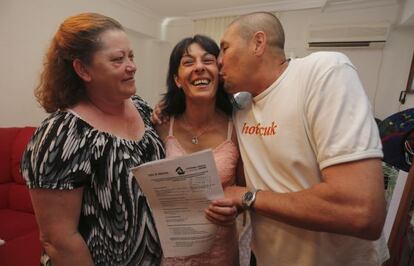Málaga woman becomes a symbol of Andalusia’s anti-eviction stance
Leftist administration’s law may face legal tests after warning from Brussels

The only challenge that Ana María Gómez set for herself when her husband walked out on her — five years ago now — was to provide for her two children. The eldest was five-years-old and the little one was just three months.
Her former spouse disappeared with barely any explanations, leaving her to deal with the mortgage. Since then, this 42-year-old woman from Málaga has been on the brink of the abyss many times, and was recently on the verge of losing her home. But for now at least, her story has a happy ending. On Monday, Gómez showed off a document that will enable her to keep her home for at least the next three years.
She is one of the first beneficiaries of the Andalusian “anti-eviction” decree. Since its approval in April, it has been implemented seven times in different provinces across the southern region.
Ana María Gómez has a contract to work two hours a day as a store clerk. She also cleans homes and cares for elderly people to make a little extra money. But it is still not enough to make ends meet; she could never have gotten this far without financial support from family members, or without her fighting spirit, either. “I gathered my own information from what I saw on TV and what I read,” she said.
I want to be a role model for my children, to show them you need to fight, not hide”
Gómez eventually turned to a court-appointed attorney for help, and the reward for all her efforts is “this small breather.”
The problem she had with the bank was the fact that the home, purchased 10 years ago, was in both hers and her ex-husband’s name, yet he no longer contributes anything to the monthly mortgage payment. And she does not earn enough to cover the full amount. So she negotiated with the lender even as she dealt with complicated divorce proceedings that included numerous days in court over her ex-husband’s refusal to pay alimony. In the last five years, Gómez has received 400 euros from her former husband.
Her eviction from the family home in the populous area of Camino de Suárez was scheduled for June 13, but it was put on hold after Gómez applied for a moratorium. In the meantime, the Andalusian government approved its controversial decree establishing its right to expropriate homes from banks for three years to prevent the eviction of low-income families at risk of social exclusion.
Two weeks ago, Gómez received good news from regional authorities: her application was approved. Now, all she needs to pay is a controlled rent of 25 percent of her income.
The next goal for Gómez is to find better job security, but at least she has won one battle: “I want to be a role model for my children, to show them that you need to fight, not hide.” But the European Union is already frowning upon this socially-minded initiative by the coalition of Socialists and United Left (communists and green groups) that govern the Andalusia region.
In a recent letter to the Economy Ministry, the European Commission sided with the banking sector, warning that there could be “a drop in the value of real estate assets,” resulting in an immediate impact on lenders' balance sheets, greater provisioning needs and less credit for businesses and individuals.
Analysts believe the law could face legal challenges. In recent years, homeowners have held massive demonstrations accusing the government of siding with the banks and not protecting mortgage defaulters.
Tu suscripción se está usando en otro dispositivo
¿Quieres añadir otro usuario a tu suscripción?
Si continúas leyendo en este dispositivo, no se podrá leer en el otro.
FlechaTu suscripción se está usando en otro dispositivo y solo puedes acceder a EL PAÍS desde un dispositivo a la vez.
Si quieres compartir tu cuenta, cambia tu suscripción a la modalidad Premium, así podrás añadir otro usuario. Cada uno accederá con su propia cuenta de email, lo que os permitirá personalizar vuestra experiencia en EL PAÍS.
¿Tienes una suscripción de empresa? Accede aquí para contratar más cuentas.
En el caso de no saber quién está usando tu cuenta, te recomendamos cambiar tu contraseña aquí.
Si decides continuar compartiendo tu cuenta, este mensaje se mostrará en tu dispositivo y en el de la otra persona que está usando tu cuenta de forma indefinida, afectando a tu experiencia de lectura. Puedes consultar aquí los términos y condiciones de la suscripción digital.








































